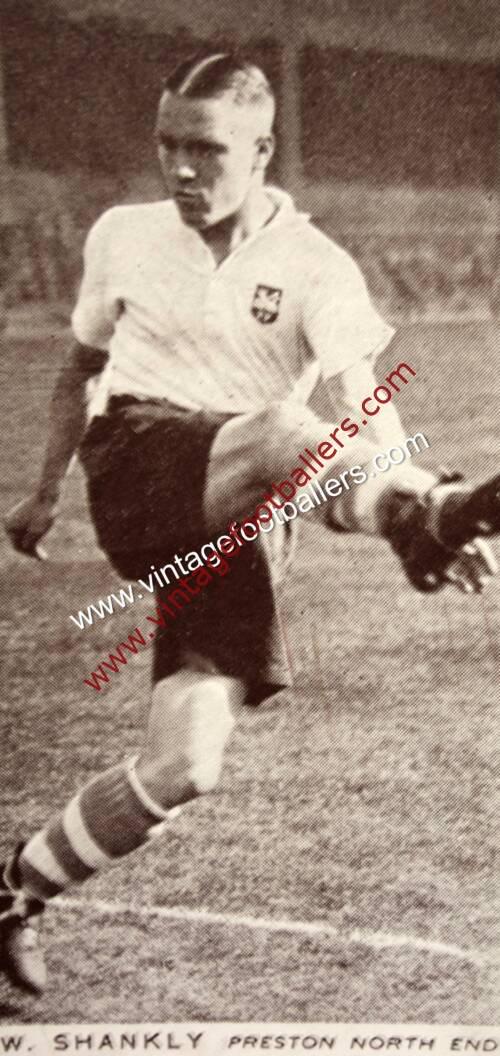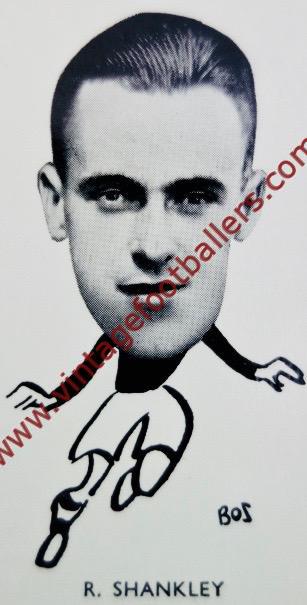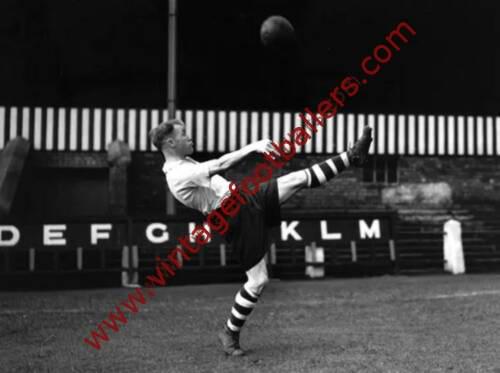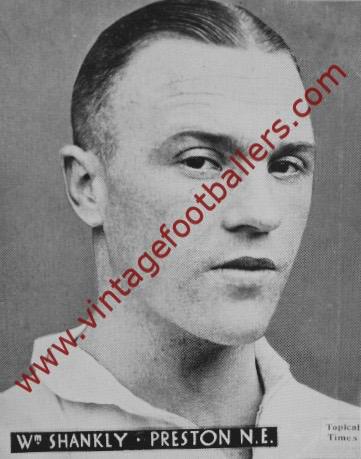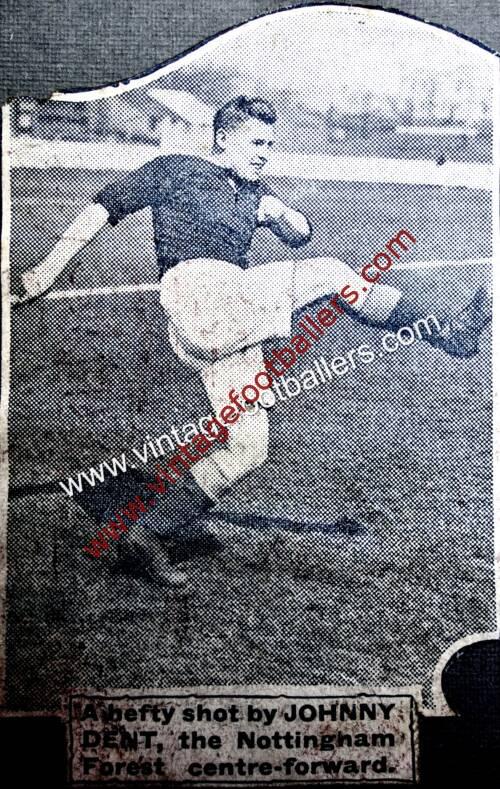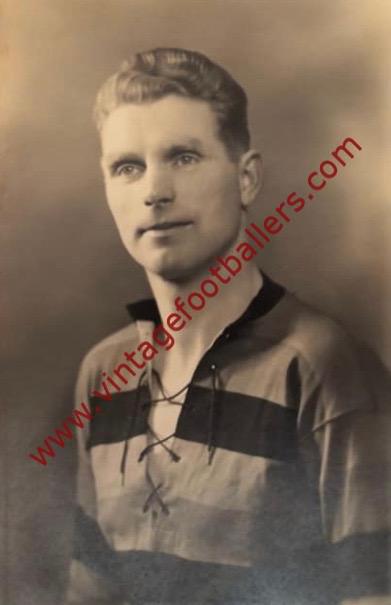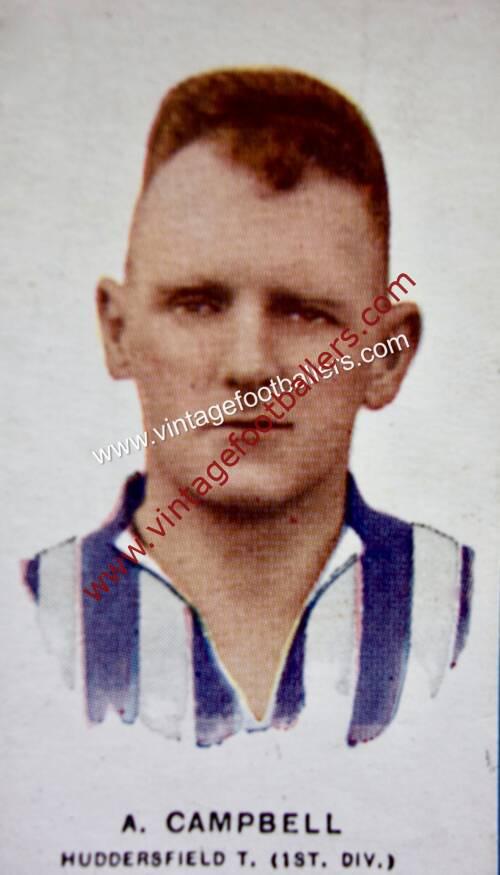Please choose your photo size from the drop down menu below.
If you wish your photo to be framed please select Yes.
Note: 16″x 20″not available in a frame.
Images can also be added to accessories. To order please follow these links
£8.95 – £49.95
Please choose your photo size from the drop down menu below.
If you wish your photo to be framed please select Yes.
Note: 16″x 20″not available in a frame.
Images can also be added to accessories. To order please follow these links
Glenbuck, Ayrshire born right half Bill Shankly became one of the most legendary football managers of all time later in life, and was one of five footballing brothers all of whom played professionally. He began his football career with Glenbuck Cherrypickers in 1930, playing for Cronberry Eglinton in 1931 before Third Division (North) Carlisle United signed him in July 1932, for whom he made his Football League debut against Rochdale on the last day of the same year. He was described as “a hard running, gritty right-half… earmarked as a key young player capable of taking Carlisle on to greater things”. He was soon spotted by Preston North End, who signed him after 16 appearances for £500 in July 1933.
He made his first team debut on 9th December 1933, three months after his 20th birthday, against Hull City. Shankly created an early goal to help Preston win 5-0, earning him praise in a national newspaper for his “clever passing”. With his wholehearted attitude and commitment to the team, he quickly established himself as a first-team regular and became a crowd favourite. In his debut season Preston fulfilled their potential and gained promotion to the First Division as runners-up to Grimsby Town. In a summary of the 1933-34 season, a Preston correspondent, Walter Pilkington, wrote: “One of this season’s discoveries, Bill Shankly, played with rare tenacity and uncommonly good ideas for a lad of 20. He is full of good football and possessed with unlimited energy; he should go far”.
In his autobiography, Shankly wrote that Preston had more than held their own in the 1934-35 season and the club was not relegated again until the end of the 1948-49 season in which he left them. Shankly developed into “as tough a half back as any in the Football League”. The outstanding Irish international Peter Doherty recalled how Shankly dogged his footsteps in one match and kept muttering: “Great wee team, North End, great wee team”, subduing Doherty completely as Preston defeated Manchester City 3-1.
In 1937 Preston reached the FA Cup Final but were well beaten 3-1 by Sunderland at Wembley. Preston recovered to reach the 1938 FA Cup Final in which they defeated Huddersfield Town 1-0 with a penalty scored by George Mutch in the final minute of extra time. As well as winning the FA Cup, Preston finished third in the League. That season marked “the pinnacle of Shankly’s playing career”.
Shankly had just reached his 26th birthday when the Second World War began and the War claimed the peak years of his playing career He joined the Royal Air Force and managed to play in numerous wartime league, cup and exhibition matches for Norwich City, Arsenal, Luton Town and Partick Thistle, depending on where he was stationed. On 30th May 1942, he played a single game for Liverpool in a 4-1 win over Everton at Anfield.
With the resumption of full League football again in the 1946-47 season, Shankly returned to Preston who held his registration, but he was now 33 and coming to the end of his playing days. By 1949, he was Preston’s club captain but had lost his place in the first team, which was struggling against relegation despite having Tom Finney in the side. Shankly was a qualified masseur and had decided he wanted to become a coach so, when Carlisle United asked him to become their manager in March of that year, he retired as a player and accepted the job. Shankly’s departure from Preston was resented by some at the club and he was refused a benefit match, to which he felt entitled. He described Preston’s attitude as “the biggest let-down of my life in football”. In all he scored 16 goals in 344 League and Cup appearances for Preston.
Shankly played for Scotland 12 times from 1938 to 1943 in five full and seven wartime internationals. He spoke of his “unbelievable pride” when playing for Scotland against England and how, when confronted by the “Auld Enemy”, the Scottish players would become William Wallace or Robert the Bruce for 90 minutes after pulling on the blue jersey. Shankly himself certainly had that spirit when playing for Scotland as confirmed by Alex James: “He is a real Scotland player who will fight until he drops”.
Shankly made his international debut on 9th April 1938 against England at Wembley; Scotland winning the match 1-0 with a late goal by Tommy Walker. Nine of his Scotland appearances were against England and the others were against Ireland, Wales and Hungary. Shankly was Scotland’s captain in the wartime match against England at Hampden Park, attended by 78,000 people on 3rd May 1941, but Scotland lost that game 3-1. Perhaps his most memorable international was the wartime game at Wembley on 18th April 1942 when Scotland won 5-4 and Shankly scored his only Scotland goal. A post-match report said that Scotland’s success was inspired by “the Busby-Shankly victory service” when Shankly and his future management rival Matt Busby combined to help Scotland’s cause. According to the Lfchistory.net website, Shankly’s goal was “probably the strangest national goal ever”. He took a speculative shot goalwards from 50 yards and the ball bounced over the England goalkeeper’s head and into the net. In January 1973, when Shankly was the subject of This Is Your Life, the goal was shown and Shankly commented that “they all count and we won”.
Much has been written of Shankly’s management career and this biography shall merely summarise it. He became Carlisle United’s manager in May 1949 staying for two years before joining Grimsby Town in July 1951 having taken Carlisle to 3rd place in the Third Division North in 1950-51. He took Grimsby to 2nd place in 1951-52 but only the champions were promoted, and after a 5th place finish in 1952-53 he joined Workington in January 1954, staying until December 1955. He became the manager of Huddersfield Town in November 1956 and the manager of Liverpool in December 1959, building the great 1960’s team of Hunt, St John & Co that took Liverpool to the Second Division Championship in 1962, to League Championships in 1964, 1966 and 1973, by when he had built a new team with the likes of Emlyn Hughes and Kevin Keegan. He won Liverpool’s first and second FA Cups in 1965 and 1974, and their first European trophy when they won the UEFA Cup in 1973 having been losing finalists in the 1966 European Cup Winners’ Cup. His achievements beyond these at Liverpool are many, his quotations and manner of being a thing of legend. He created the base on which Liverpool Football Club became (and remains) one of the world’s great footballing powers.
Shankly was awarded the OBE in November 1974, four months after he retired as Liverpool manager that July after their FA Cup victory. Liverpool erected the 15-foot high cast iron Shankly Gates in front of the Anfield Road stand. Inscribed “You’ll Never Walk Alone”, they were opened by Nessie Shankly in August 1982. In 1997, a seven foot tall bronze statue of Shankly was unveiled outside the stadium’s Kop end. He is also commemorated at Preston; when the former Spion Kop end was replaced by a new stand in 1998, it was named the Bill Shankly Kop and was designed with different coloured seats providing an image of Shankly’s head and shoulders.
In April 2013, Shankly was honoured by Royal Mail in the United Kingdom, as one of six people selected as subjects for the “Great Britons” commemorative postage stamp issue.
His brothers were Alec, known as “Sandy” by the family, who played for Ayr United and Clyde; Jimmy (1902-1972), who played for various clubs including Sheffield United and Southend United; John (1903-1960), who played for Portsmouth and Luton Town; and Bob (1910-1982), who played for Alloa Athletic and Falkirk. Bob became a successful manager, guiding Dundee to victory in the Scottish Championship in 1962 and the semi-finals of the European Cup the following year. Their maternal uncles, Robert and William Blyth were also professional players and both became club directors at Portsmouth and Carlisle United respectively.
NB In this photograph he is standing with Preston team mate Hugh O’Donnell.
| Weight | N/A |
|---|
